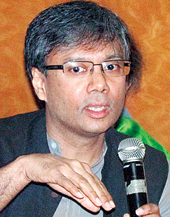
Amit Chaudhuri
A dream of wholeness seemed to animate the concluding day of the symposium on literary activism held in the city from December 2 to December 4.
Peter D. McDonald, professor of English and related literatures at Oxford, spoke about an essay by Maurice Blanchot, novelist and critic. Blanchot is not a familiar name outside academia. Moreover, the Frenchman may have struck fear in some hearts with his reputation as someone who had influenced the works of Jacques Derrida. And McDonald announced that he was going to speak in two voices: that of Don Q (somewhat like Don Quixote) and Sancho P (somewhat like Sancho Panza). His paper was titled Blanchot's Giant-Windmill. Note the hyphen.
McDonald spoke about an essay by Blanchot called What about criticism?, which first appeared in 1959 in French in the journal Arguments, a platform for a dissident group of Marxists. Don Q said that Blanchot was saying that criticism was nothing - and its very nullity was its most essential truth. Criticism was not a form of external judgment that conferred value on the literary work. Modestly, and obstinately, it remained nothing, taking on the mantle of creative language itself.

Peter D. McDonald
The younger Sancho P scoffed at this as romantic fluff, saying the world has moved on since. The trajectory of Blanchot's essay spoke for itself. Some 40 years after its first appearance, it appeared in English in the Oxford Literary Review under the title The Task of Criticism Today. The journal's name is a joke: it has a tenuous link with Oxford University and it does not review original literature; instead it is a platform for French deconstructive thought in the English-speaking world, run by academics and published by the Edinburgh University Press. Blanchot made his living as a journalist and writer.
The university has changed, publishing has changed, the media and institutions through which the critical language enters the public domain have changed, Amazon decides what to read. What hope is there? Where would Blanchot be first published today?
Don Q stood his ground. Or perhaps tilted at the windmill? Literary criticism was at one with the literary work. Only then it led to the discovery of the strangeness of the literary work. It was a good definition of romantic love, a word that came up often at the symposium organised by the University of East Anglia in India.
Swapan Chakravorty, the second speaker at Presidency University where the event was held on the third day, took the idea of literary activism a step further and spoke about 'literary surrogacy' in the context of 20th century Bengali writing.

Rosinka Chaudhuri
Chakravorty, professor of English at Jadavpur University and former director-general of National Library, defined the surrogate as one who is better able to serve another's function. When literary activism, a project with a certain aim, flowed out of its limits, surpassed its 'programmatic intent' and took on a life of its own, there was a surplus, and this was literary value.
He spoke of surrogacy as a 'defect', a blemish in the original project, and also a running away, 'defection' -'the eruption of the poetic in philosophy', an unpremeditated, welcome end.
He spoke of three moments of genesis that were continuing into the future.
He spoke of the swadeshi literature, Tagore in particular. Tagore withdrew from the swadeshi movement to start the school in Santiniketan, focussing on rural reorganisation and education as a solution to social problems. Tagore's other projects too, literary and otherwise, were legion. But Chakravorty mentioned his novel Gora, which encapsulated many of the crucial debates of the day about politics, society, identity and gender, with particular emphasis.
Gora, a young, energetic, staunch Hindu who is a great apologist for his religion, is devastated by the knowledge that he is actually an orphan, born of Christian parents, only raised by the Hindu ones. But it has a strange liberating effect on Gora. ' Gora starts with the burden of literary activism and is relieved into literary surrogacy,' said Chakravorty.
The other two 'moments' Chakravorty spoke of were the Hungry Generation movement in the Bengal of the Sixties and Seventies and the Naxalite literature.

Swapan Chakravorty
And 'the cognition of the text is the cognition of one's own self'. The reader should be at one with what he is reading, he added, referring to Abhinavagupta's commentary on Bharata's Natyashastra, where he asks the listener to be ' sahriday', but it is a relationship of identity and distance with the work. The reader recognises the anxiety felt by the character, yet enjoys it.
The last speaker, Rosinka Chaudhuri, professor in cultural studies at the Centre for Studies in Social Sciences, Calcutta, and author of the book The Literary Thing: History, Poetry and the Making of a Modern Literary Culture, spoke about how writers in 19th century Bengal, especially Ishwarchandra Gupta, constructed their own modernity on their own terms.
She gave fascinating instances from Ishwarchandra Gupta, the poet gifted with a sharp satirical eye often directed at Europeans and a colourful language, but condescended to for not being 'respectable' enough or having enough literary value, documenting the works of other poets, especially Bharatchandra, his predecessor, who often wrote eloquently in a mesmerising mixture of Bengali and Persian.
Writers themselves archiving writings, such as Ishwarchandra, were constructing a tradition. When the material was multilingual, as with Bharatchandra, it led to the construction of lineages and genealogies of the language that were not official.
The organisers hope to make the symposium an annual event. The city will be sahriday.











